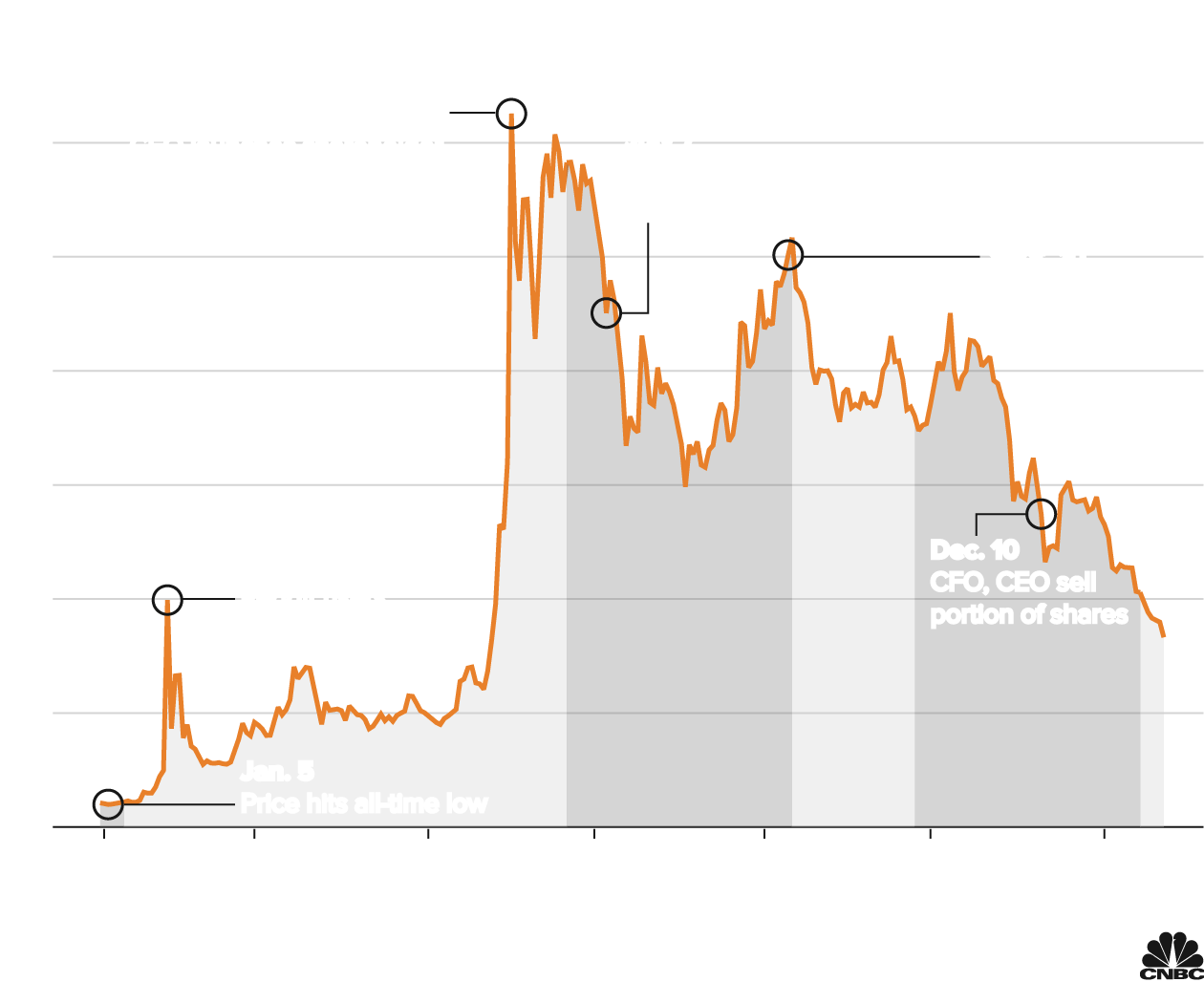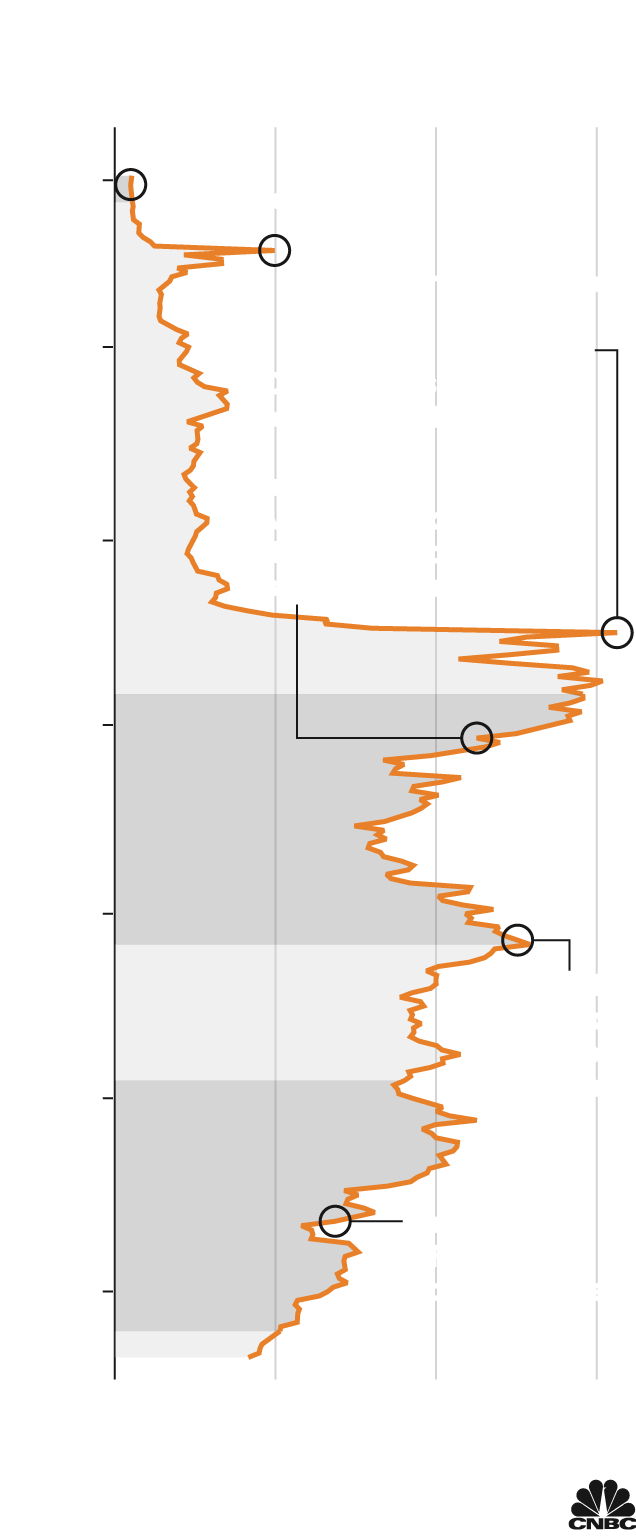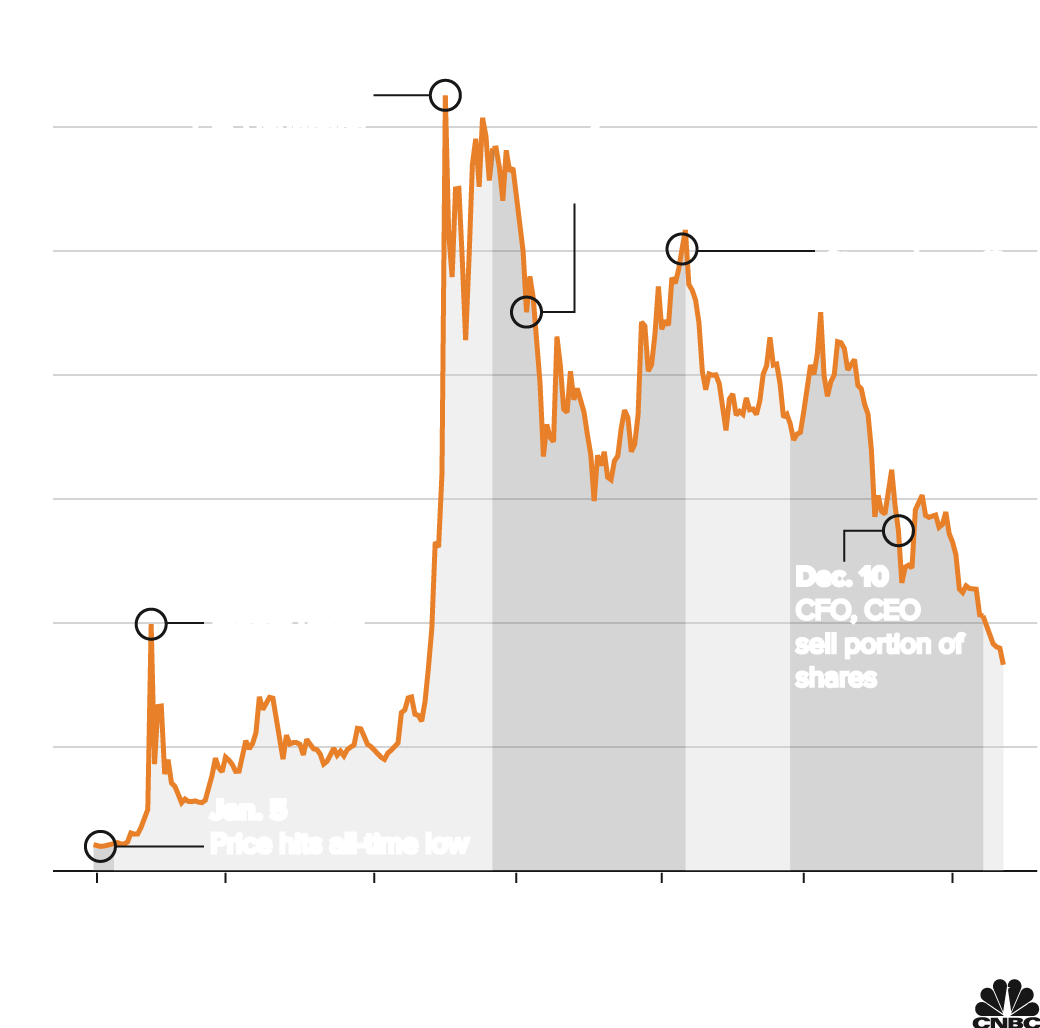How AMC rode the meme stock rally to revitalize its business
The AMC Burbank 16 and the Batman bronze statue in Downtown Burbank.
AaronP/Bauer-Griffin | GC Images | Getty Images
After a year of massive stock gains, AMC Entertainment shares are starting to cool off.
The movie theater chain, which narrowly avoided bankruptcy last January, was the beneficiary of a flurry of new retail investors who helped the company secure much needed capital. These ardent fans led a campaign that bolstered AMC’s shares to an all-time high of $72.62 last June.
Even though shares closed Tuesday at $16.02, AMC is in a better position in 2022 because of the support this new wave of investors and the opportunistic actions of its CEO Adam Aron.
“Of all the meme stocks, AMC seems to be the smartest firm to take advantage and recognize the opportunity there,” said Eric Wold, senior analyst at B. Riley Securities.
As retail investors hoisted the company’s shares to new highs, Aron made strategic stock sales and amassed a $2 billion “war chest” that could be used to invest in theater upgrades and new cinema leases.
“Adam Aron got a huge gift with these retail investors,” said Eric Handler, media and entertainment analyst at MKM Partners. “He could then sell enough stock to give AMC enough cash to survive.”
With more secure footing, AMC can focus on shoring up its balance sheet, reducing its debt load and interest expenses and expanding its content and concession offerings. AMC is facing plenty of challenges. The movie theater industry has yet to fully recover from the ongoing global pandemic. Meanwhile, its new investor base may be fracturing, with some shareholders having unrealistic expectations for AMC’s growth, while others leave it behind.
Amassing a ‘war chest’
At the start of 2021, AMC was in desperate need of a cash infusion. Without funds, analysts said it was likely going to have to file for Chapter 11 bankruptcy protection in order to restructure more than $5 billion in debt it had amassed prior to the pandemic. It was at this time that the company’s stock hit an all-time low of $1.91.
However, on Jan. 25, 2021, AMC was able to raise around $500 million by issuing new common stock and $411 million of incremental debt from upsizing and refinancing its European revolving credit facility. Shares of the company jumped to around $5 a share on this news.
This, coupled with a $100 million shot in the arm in late 2020 from Mudrick Capital Management meant that “any talk of imminent bankruptcy for AMC is completely off the table,” Aron said at the time.
Two days later, AMC’s stock began its wild ride in earnest. Shares surged 300% to $20 as investors in the Reddit community triggered a short squeeze.

AMC share price
June 2
CEO launches shareholder
perks, including free popcorn
July 7
AMC says it won’t seek shareholder
approval to issue new shares
Sept. 10
Strong box office
for “Shang Chi”
Dec. 10
CFO, CEO sell
portion of shares
Dec. 10
CFO, CEO sell
portion of shares
Jan. 27
Reddit users
pile into stock
U.S. COVID
CASES RISING
U.S. COVID
CASES RISING
Jan. 5
Price hits all-time low
Chart: Nate Rattner / CNBC
Source: FactSet. As of Jan. 24, 2022.

AMC share price
Jan. 5
Price hits all-time low
Jan. 27
Reddit users pile into stock
June 2
CEO launches shareholder
perks such as free popcorn
July 7
AMC says it won’t seek
shareholder approval to
issue new shares
U.S. COVID
CASES RISING
Sept. 10
Strong box
office for
“Shang Chi”
U.S. COVID
CASES
RISING
Dec. 10
CFO, CEO sell
portion of shares
Chart: Nate Rattner / CNBC
Source: FactSet. As of Jan. 24, 2022.

AMC share price
June 2
CEO launches
shareholder perks,
including free popcorn
July 7
AMC says it won’t seek shareholder
approval to issue new shares
Sept. 10
Strong box office
for “Shang Chi”
Dec. 10
CFO, CEO
sell portion of
shares
Jan. 27
Reddit users
pile into stock
U.S. COVID
CASES RISING
U.S. COVID
CASES RISING
Jan. 5
Price hits all-time low
Chart: Nate Rattner / CNBC
Source: FactSet. As of Jan. 24, 2022.
A rise in investing apps like Robinhood allowed retail investors to trade stocks more easily and with little to no commission fees. Emboldened by fellow members of the Reddit community, these new investors began targeting stocks that were heavily shorted, hoping to cause losses for the hedge funds that had bet against the beat-up stocks. GameStop and Bed Bath and Beyond were among the other stocks bolstered by the trend at that time.
Hedge funds had been betting against AMC’s stock because its troubles were well known. Movie theaters had been shuttered for months, and when they reopened, new waves of Covid-19 cases kept audiences home. Vaccines were not yet widely available and few blockbuster films were coming to the big screen. Those that did were often released on streaming platforms on the same day.
Additionally, while the majority of AMC’s theaters were reopened to the public, local governments had implemented seating caps of between 15% and 60%, greatly limiting the number of tickets the theater could sell.
The new investors quickly became AMC’s majority stakeholders, and continued to back the stock, allowing Aron to make some strategic stock sales in May and June to fill up AMC’s coffers.
On May 13, AMC sold 43 million shares at just under $10 apiece, raising $428 million. Following this cash infusion, shares of the company jumped to around $25 — an unusual reaction to such news.
Then on June 1, AMC struck another deal with Mudrick Capital Management to exchange 8.5 million shares of the company for $230.5 million in cash. The equity was issued at a price of about $27.12 per share.
The next day, retail investors once again poured into AMC stock. Its price skyrocketed to more than $70. On June 3, AMC sold another 11 million shares, this time at $50.85 each, generating nearly $600 million in fresh capital.
The company was also able to repurchase around $35 million of first lien debt in September, which cost $41.3 million, including principal and accrued and unpaid interest. This debt reduction reduced AMC’s annual interest costs by $5.25 million.
Wooing the ‘apes’
Wold said Aron was smart to shift his focus from industry analysts to the growing number of retail investors, who began calling themselves the “ape army.”
AMC shifted its communications strategy to speak directly to shareholders via social media, including on YouTube. It launched a portal on its website for individual investors in early June. The site required stockholders to self-identify and sign up for the chain’s loyalty program. In return, shareholders received special offers and company updates.
Aron renewed his interest in Twitter, following hundreds of accounts tied to the ape army. And the AMC shareholder meeting was delayed by more than a month to give the apes an opportunity to attend.
‘A massive disconnect’
Even with these staunch supporters, some of the air came out of AMC’s stock. In the second half of last year, the shares averaged $40.
The domestic box office had begun to recover. Major titles like Disney’s “Shang-Chi and the Legend of the Ten Rings,” in September 2021, and Warner Bros.’ “Venom: Let There Be Carnage,” released Oct. 1, 2021, each generated more than $200 million in ticket sales during their theatrical runs. But new coronavirus variants — first delta, then omicron — have dampened the industry’s rally.
Older audiences have remained wary of returning to cinemas. And some parents are staying home as well. Children aged 5 to 11 weren’t approved for the Covid vaccine until late October, and those under 5 years old still aren’t eligible. It wasn’t until the December release of Sony’s “Spider-Man: No Way Home” that the movie theater business saw some semblance of normalcy and that feat won’t be easily repeated until at least the second quarter of 2022, industry analysts say.
Additionally, despite warnings that Aron and other executives had plans to reduce their AMC holdings, some investors became disillusioned. Aron has sold more than $40 million worth of shares since November as part of a prearranged estate planning strategy.
By the end of 2021, AMC shares had fallen to under $30 per share.
“The share price decline appears to be primarily related to shareholders who defected after management offloaded shares over the past two months,” said Alicia Reese, analyst at Wedbush. “There are, of course, the faithful who continue to cheer each other on and maintain their positions, and in some cases they continue to buy shares.”
In recent weeks, AMC’s shares have further declined in price, bottoming out at around $16 per share. Handler attributed the decline to investors “derisking” their portfolios. There also could be a realization that AMC’s valuation is incongruent with its balance sheet, he said.
Many of the company’s retail investors have said they believe that there will be a “mother of all short squeezes” that will bump AMC’s stock price to $1,000 per share. However, that share price would put AMC’s market cap at $513 billion, a figure that is eight times what the entire theatrical industry made in global revenue before the pandemic, Handler explained.
“That’s a massive disconnect,” he said.
At about $16 per share, AMC is trading at 27 times its forecasted EBITDA for 2022 and 21 times its expected EBITDA for 2023. Historically, movie theater companies have traded at between six and nine times EBITDA, Handler said, with nine times being a historical peak.
“This stock is still trading several standard deviations above where it probably should be trading,” he said.
The next chapter: Debt repayment
AMC’s next focus is on repaying debt. On Monday, the Wall Street Journal, reported that AMC is in advanced refinancing talks with multiple interested parties to lower its interest burden and stretch out its maturities by several years.
When reached by CNBC, AMC declined comment on the Journal’s report. The company also declined to comment for this article.
Earlier this month, Aron identified debt restructuring as a key goal for 2022. None of its debt comes due until next year.
“In order to meaningfully repay AMC’s debt balance, I think Adam Aron will have to request more shares to sell, from investors very reluctant to allow further dilution of AMC stock,” Reese said. “I think, instead, he’ll focus on extending maturities and improving interest rates by negotiating with debtors.”
“The recent share price decline will make that far more difficult, however,” she added.




